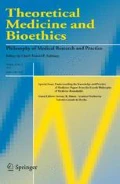Abstract
At the heart of Peter Singer’s utilitarianism is the impartial weighing of the interests of those affected by our actions. Singer calls this the Principle of Equal Consideration of Interests. This paper argues that Singer’s Principle does not accord with our moral intuitions and the logic of our moral thinking. It discusses the Principle in the context of the parable of the Prodigal Son and his Brother – a parable that raises the issue of impartiality in a particularly challenging way. What the parable shows is, first, that our moral thinking often turns on judgements of fairness that are prior to any impartial weighing of interests; and, second, that impartial fairness itself is sometimes transcended by compassionate love. Both of these points have important implications for bioethics.
Similar content being viewed by others
Author information
Authors and Affiliations
Corresponding author
Rights and permissions
About this article
Cite this article
Coghlan, P. The Prodigal and his Brother: Impartiality and the Equal Consideration of Interests. Theor Med Bioeth 26, 195–206 (2005). https://doi.org/10.1007/s11017-005-3978-8
Issue Date:
DOI: https://doi.org/10.1007/s11017-005-3978-8



